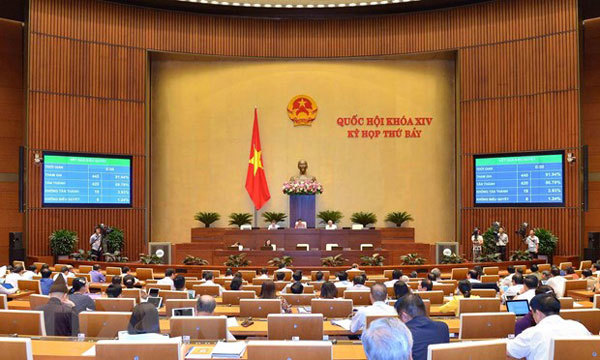Public investment mainly used to pay debts: minister
Vietnam Bank Association calls for raising charter capital at four major State banks
 |
| The National Assembly passed the Resolution on State budget final accounts for 2017 with 91.53 per cent approval at the ongoing seventh session of the 14th legislature yesterday. — VNA/VNS Photo Phuong Hoa |
According to the resolution, the total State budget collection surpassed VND1.683 quadrillion (US$72.1 billion), while the total State budget spending was more than VND1.681 quadrillion.
The State budget overspending was more than VND136.9 trillion ($5.87 billion), or 2.74 per cent of the gross domestic product (GDP).
Chairman of the NA’s Committee on Finance and Budget, Nguyen Duc Hai, reported that in the 2017 fiscal year, the Government directed ministries, departments and localities to take measures to tighten financial and budget discipline and handle violations.
However, misplaced spending still exists while the implementation of budget spending tasks by some ministries, centrally-run agencies and localities remains slow, he noted.
The NA assigned the Government to direct ministries, centrally-run agencies and localities to address shortcomings in the allocation, use and management of public investment projects, and handle basic construction debts.
Promoting thrifty practices and preventing wastefulness and corruption as well as strictly handling individuals and organisations who violate the management and use of the State budget are a must, according to the resolution.
Later the same day, the NA adopted a resolution on developing laws and ordinances in 2020 and adjustments to the programme for 2019 with 92.56 per cent of deputies voting in favour.
Reserve force
Yesterday morning, NA deputies talked about the necessity of a draft Law on Military Reserve Force.
Most deputies agreed that upgrading an Ordinance on Military Reserve Force to a Law on Military Reserve Force was necessary as it would create a comprehensive legal framework and meet the requirements of safeguarding the country.
They said that the policy for reserve force prescribed in the Ordinance wasn’t relevant to the average income and did not suit the current legal system.
The Ordinance has not yet specified the regimes and policies for people involved in the reserve force building task, they said.
Deputy Le Ngoc Hai from Quang Nam Province said the Ordinance on the Reserve Force has obtained a lot of achievements over the past 20 years, laying the foundation for the building of strong armed forces and fulfilling the missions of national defence. However, many guidelines of the Party and new provisions of the 2013 Constitution relating to the reserve force have not yet been institutionalised. Shortcomings have been revealed during the implementation of the ordinance and it should be amended to be in line with requirements of national defence. The building of the law is essential in the current situation, he said.
Deputy Nguyen Van Chuong from HCM City agreed with Hai’s opinion. He suggested the compiling committee consider the impact of the country’s economic restructuring while setting forth the law’s content.
In response to deputies’ proposal of supplementing regulations on the role and function of the reserve force in the Law, Minister of Defence Ngo Xuan Lich said that the reserve force is a part of the Army. The role and function of this force are consistent with the role and function of the Army as stipulated in Article 66 in the 2013 Constitution. Thus, the Ministry of Defence proposed the National Assembly to retain the function of the reserve force as stated in the draft Law.
Regarding the policies for the reserve force, Lich said it was made based on the principle of ensuring good health and reasonable incomes for them.
VNS
 The National Assembly passed the Resolution on State budget final accounts for 2017 with 91.53 per cent approval at the ongoing seventh session of the 14th legislature yesterday.
The National Assembly passed the Resolution on State budget final accounts for 2017 with 91.53 per cent approval at the ongoing seventh session of the 14th legislature yesterday.